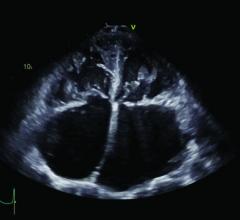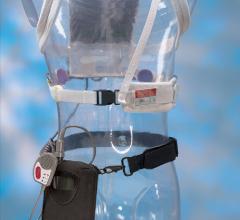The U.S. Food and Drug Administration (FDA) announced a Class I recall of Sterilmed’s Agilis Steerable Introducer Sheath’s hemostatic valve that prevents blood from flowing back through the valve, warning that it may fail due to an improper seal of the sheath hub. The agency said improper seals can allow blood to leak through the hub, cause the cap to fall off during the procedure, or can create a difference in pressure that allows air into the circulatory system (air embolism). The FDA warned the use of affected products may cause serious health consequences for patients, including death.
Adam Greenbaum, M.D., co-director, Center for Structural Heart Disease, Henry Ford Hospital, Detroit, explains how his ...
Abbott announced U.S. Food and Drug Administration (FDA) approval for magnetic resonance (MR)-conditional labeling for the Quadra Assura MP cardiac resynchronization therapy defibrillator (CRT-D) and Fortify Assura implantable cardioverter defibrillator (ICD). The approvals follow recent MR-conditional labeling approvals for the Assurity MRI pacemaker, Ellipse ICD and associated MRI-compatible leads, and further expand Abbott's portfolio of MRI-ready devices for patients indicated for ICDs and/or CRT-D devices who may need an MRI in the future.
Providing exceptional cardiovascular care for patients to achieve the best possible outcomes is the number one goal for ...
The U.S. Food and Drug Administration (FDA) issued the final version of the guidance, “Technical Considerations for Additive Manufactured Medical Devices." Additive manufacturing (AM), the broad category of manufacturing encompassing three-dimensional (3-D) printing, is an emerging technology. This guidance is not intended to introduce new policy, but rather outlines the Agency’s current thinking about the technical aspects associated with AM processes, and provides manufacturers with recommendations for device design, manufacturing and testing considerations for use when developing devices that include at least one additively manufactured component or additively fabricated step.
Chagas disease (ChD), an infectious parasitic disease transmitted primarily by triatomine insects, has become a significant public health problem in recent decades. While many ChD patients suffer only minor symptoms, 20-30 percent develop chronic heart disease (ChHD); the variety of possible abnormalities caused by ChHD requires understanding of how different imaging modalities can assist in diagnosis and treatment decisions. A new document, Recommendations for Multimodality Cardiac Imaging in Patients with Chagas Disease: A Report from the American Society of Echocardiography in Collaboration With the InterAmerican Association of Echocardiography (ECOSIAC) and the Cardiovascular Imaging Department of the Brazilian Society of Cardiology (DIC-SBC), aims to provide the first comprehensive guidance for how best to use the multiple cardiac diagnostic tools to assess and monitor the growing number of patients with these Chagas-induced heart problems.
January 2, 2018 — Osborne & Associates Law Firm, P.A., of Boca Raton, Fla., has filed suit in Palm Beach Circuit Court ...
Cardiac positron emission tomography (PET) is growing in popularity among cardiologists because it provides the ability ...
RenalGuard Solutions Inc. reported positive results from a first-in-man feasibility study focusing on a novel use of the RenalGuard System to manage fluids during diuretic therapy in congestive heart failure patients suffering from fluid overload. The results were recently presented at the annual Devices in Heart Failure (D-HF) Congress, Dec. 15-16 in Berlin, Germany, by Prof. Piotr Ponikowski, M.D., of the Wroclaw Medical University, Poland, and Prof. Felix Mahfoud, M.D., of the Saarland University Hospital, Homburg, Germany.
The Heart Rhythm Society (HRS), in partnership with WebMD Education, announced in December the launch of a free, online educational tool called “How to Reduce Your Risk of Stroke Due to AFib.” The new tool is part of a larger series of educational activities hosted by WebMD Education to help patients, caregivers and those who may be at risk to learn more about various medical conditions. The AFib-focused tool is an easy-to-use, interactive activity delivering important information straight into the hands of the user. This is the first collaboration between HRS and WebMD Education.
December 29, 2017 — iVascular announced the release of the new Oceanus 14 Pro percutaneous transluminal angioplasty (PTA ...
When performing radiofrequency (RF) ablation to treat cardiac arrhythmia, medical professionals must balance the safety ...
ITN and DAIC Editor Dave Fornell takes a tour of some of the most interesting new medical imaging technologies on the ...
Vivasure Medical announced in October the successful enrollment of the first patient in the Frontier IV clinical study, a non-randomized multicenter international trial, designed to expand the indications of the PerQseal large arteriotomy closure technology. The patient was enrolled by Peter Crean, M.D., at the Blackrock Clinic, Dublin, Ireland.

The Diagnostic and Interventional Cardiology (DAIC) website had another record year with 1.4 million page views in 2017 ...
Change Healthcare Cardiology Hemodynamics is an integrated hemodynamic monitoring system for monitoring vital signs and ...
Corindus Vascular Robotics Inc. announced recently that Houston Methodist DeBakey Heart & Vascular Center has launched the first vascular robotic program in the Houston area with the installation of two Corindus CorPath GRX Systems. In addition and as part of the program launch, Corindus will partner with Houston Methodist to develop a Global Center of Excellence that will seek to advance clinical research on robotics and to train interventional cardiologists on robotic-assisted percutaneous coronary interventions (PCI).
December 28, 2017 — Zoll Medical Corp. and Myant, Inc., a high-tech advanced manufacturing company, announced they have ...
HeartFlow Inc. announced that Health Care Service Corp. (HCSC), which operates Blue Cross and Blue Shield plans in five states, has issued a medical policy for the HeartFlow FFRct Analysis, a non-invasive technology that helps clinicians diagnose and treat patients with suspected coronary artery disease (CAD). HCSC — which operates Blue Cross Blue Shield plans in Illinois, Montana, New Mexico, Oklahoma and Texas — has determined that the use of noninvasive fractional flow reserve (FFR) following a positive coronary computed tomography (CT) angiogram may be considered medically necessary to guide decisions about the use of invasive coronary angiography in patients with stable chest pain at intermediate risk of CAD.


 January 04, 2018
January 04, 2018















